I'm sorry about this little nuisance, but you know, rules are there, and I wouldn't like to see this wonderful AAR closed for such a thing. Keep doing it so good!
"One and Indivisible" (A Russian Kaiserreich AAR)
- Thread starter Teivel
- Start date
-
We have updated our Community Code of Conduct. Please read through the new rules for the forum that are an integral part of Paradox Interactive’s User Agreement.
You are using an out of date browser. It may not display this or other websites correctly.
You should upgrade or use an alternative browser.
You should upgrade or use an alternative browser.
Hopefully, the proletariat will take power from the reactionary and dying nobilityThe Romanovs are committed to Russia being one, whole and indivisible. Having played ahead a little however i can tell you it's not going to be as easy a ride as i had initially thought.
@trekaddict: I lack the ability to change the basic KR set up so Great Britain is syndicalist. Even if i had this ability though, i can't see how the rescue attempt would have prefented the revolution there. At first glance it appears that the rescue of the royals was a sacrifice bunt on the part of the British...but we shall see.
In our timeline, George V didn't rescue his relatives because worsening conditions for the British people, and fears that revolution might come to the British Isles, led him to think that the presence of the Romanovs might seem inappropriate under the circumstances.
I never really understood the existence of syndicalist GB in Kaiserreich, but the rescue of the Romanov might have pushed things to the breaking point. I personally think your alternate history is more realistic
Chapter 4: The New Russian Army
The Office of the President:
The Office of the President:
The Grand duke sighed heavily as the three military men saluted and made their exit. He had called the three most senior figures in the Russian military together to discuss the potential for the reform and reconstruction of an army decimated by time, attrition, apathy and civil unrest.
Denikin, Wrangel, Vlasov, all had presented their proposals. All had striven to undercut each other in front of him and each had been supremely confident that their plans were the key to the restoration of Russia's once proud military.
The tomes of paper before him were testaments to their confidence, indeed Denikin had seen fit to include a set of General Orders enacting the first stage of his reforms at the end of the document.
He understood that resources were limited but he was still somewhat dismayed as he flicked through the thick documents the Generals had left behind.
Denikin's mass conscript army sounded suspiciously like the force that had been cut to ribbons in 1914 by a force a fraction of its size. And yet the man presented it as the logical force structure for a nation of Russia's unique character.
Tradition, tradition was the word he had used.
The president shook his head in dismay. The Russian traditions of self sacrifice, dedication to ones nation, czar and heavenly father had seen legions of her young men willingly throw themselves into a fray few of them truly understood with a passion that should have rocked the world. The Russian tradition of infighting and incompetence at the highest echelons of military leadership however, had seen those soldiers brutally beatenand the nation had imploded under the strain. Suffice to say that the Grand Duke was not at all eager to see the continuation of that particular tradition. Russia would be lead by its betters, as was just and proper, but it would not be lead to the slaughter.
Not that Wrangel's proposal was much better. The Grand Duke was not a military man, a fact he would freely admit, but from where he sat it seemed that the General may have learnt the wrong lessons from the War. His proposal called for modernising the equipment of the basic Russian soldier, arming and feeding him properly and providing him with a generally more modern military establishment to serve. It redressed many of the horror stories of the 14-17 conflict. No more, he had said, would Russians be asked to fight bereft of food and ammunition. And yet he too agreed that the traditional command structure should be restored. Stability, he had said, demanded a return to the steadfast leadership of the well born officer corps.
The most radical proposal had come from Vlasov who, as the Grand Duke noticed, had been openly ridiculed by both Denikin and Wrangel, essentially called for the emulation of the German model. Vlasov, in his documents, called for a reduction in conscription, the expansion of the professional corps of NCOs and the devolution of certain, command decisions down to the tactical level. Autonomy in the hands of Lieutenants and even Sergeants...it had been almost scandalous when openly suggested and yet, to the Grand Duke it seemed an appropriate reflection of the success enjoyed by more flexible and informal units during the civil war.
And yet it still looks backwards
All Vlasov promised was that Russia may, after several years, establish a force roughly analogous to the German army of the Great war era....
If there was to be another war, the best Vlasov could promise would be that Russia would be capable of performing as Germany had during the five years of campaigning that had bled the Kaiser's armies white.
The Grand duke set the final, monumental tome aside in dismay. He did not wish to be the man responsible for sending the flower of the Nation's youth off to dash themselves against hardened fortifications for the second time in a half century.
Lowering his head to his desk he expected to feel the hard kick of the mahogany but instead received the soft kiss of faded leather. Inquisitively he rose and refocused his tired eyes. Buried underneath the pile of paperwork the Generals has so gladly dumped on his desk was a fourth folder.
It was thin, perhaps a hundred and fifty pages at most, and wrapped in the most unassuming binding of the lot.
More curious than anything the grand duke opened the folder and began to read, assuming it to be an annex or apendix of one proposal or another.
He continued to do so for more than an hour before he finally called for his assistant.
“Sokhov, I need you to find me these two men.”
–
Sergei Leonidovic Markov was immaculately attired in a freshly pressed dress uniform, lines of decorations pinned to his breast. The polish in the material brought out the flash of energy burning behind his ageing eyes. With his neatly trimmed moustache, he was the very image of that specific breed of White Russian gentry that had had endured and even thrived in Russia over the past two decades of chaos.
Across the room however, his partner stuck a very different figure.
He wore a dull olive field uniform, a Private's stripes crudely stitched onto the coarse fabric in a way that seemed almost comical when contrasted with the line of glinting metal decorations pinned neatly on the breast.
“You had to wear them didn't you?” Markov enquired, doing his utmost to sound light hearted yet failing miserably.
Mikhail Tukachevsky followed the General's gaze down to the array of glinting red stars amongst his awards.
“Why not? The general order relieved me of my rank, not my decorations.”
His voice was gruff as he mentioned General Order 1936-4. The General order had “suspended” the ranks of numerous officers in the Moscow and Petrograd Districts from the level of Major upwards to 'enable an effective review and re-adjustment of military leadership and policy.' In reality it represented the removal of any and all vestiges of the old red army leadership from positions that could pose a direct threat to the newly reconstituted government.
Major General Mikhail Tukachevsky, one of the civil war's most talented leaders, had been one of the casualties.
Markov didn't take the bait and instead broke out a mild smile.
“Very true I suppose, though I do hope you left your Distinguished priest killing cross out at the very least, you know the Grand Duke is an appropriately religious man.”
Tukachevsky realised there was a time, only a few years ago, where he would have smashed the white commander to the floor, teeth broken and bloodied over such a comment. Indeed, less than twenty years before hand he would have gladly shot the man before he'd even spoken.
But time had changed him, and the past months had altered his perception of this bastard beyond all recognition. And so he laughed...
“Yes Sergei, I left it right next to that citation you won for getting your ass whipped by a bunch of starving, illiterate peasant girls.” Having heard Markov hack out a short chuckle in return, the dour faced officer continued.
“The Grand Duke knows who I am, I will not insult his intelligence by pretending otherwise. You are the respectable one, just make sure he listens.” His last words were married with a pointed stare towards the dull black leather case the aristocrat carried by his side, containing a copy for their rather...unorthodox...suggestions for the reformation of the Russian military.
Before Markov could reply, one of the attendants walked up and bowed ever so slightly.
“Gentlemen, the Grand Duke will see you now.”
Markov nodded and followed towards the guarded office doors, doing a quick double check of his uniform as he did so.
“Just don't call him a pig, private, that's an order” he whispered as the antique doors opened wide.
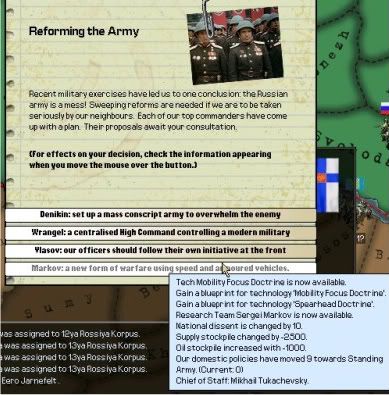

Last edited:
- 2
Originally, when i got a new computer i figured that continuing this AAR would be impossible.
Well now, after spending a tremendous holiday period catching up on stuff i've always wanted to do and generally taking advantage of the free time i've come to the conclusion that of all my little writing projects, this is the one i most wanted to write through to the end.
I've broken out the old drive and connected it externally and once i run out of saved images I'll move back to playing the game which i believe is still safely saved. My apologies for the rusty style and the epic thread necromancy but hopefully there are still one or two readers on this old board.
Well now, after spending a tremendous holiday period catching up on stuff i've always wanted to do and generally taking advantage of the free time i've come to the conclusion that of all my little writing projects, this is the one i most wanted to write through to the end.
I've broken out the old drive and connected it externally and once i run out of saved images I'll move back to playing the game which i believe is still safely saved. My apologies for the rusty style and the epic thread necromancy but hopefully there are still one or two readers on this old board.
Last edited:
Necromancy is never wrong for a promising AAR.
There is no necromancy when the author brings his aar back to life, methinks.
Oh Sergei Markov, the darling of all Russian KR AARs, ascends the stage alongside that Bolshevik running dog Tukachevsky. With that pair in charge, the enemies of the Motherland should sound face death in the shape of an Orthodox panzer brigade.
Chapter 5: A World Trending Towards Chaos.
A Document Collection.
For the first time in years it seems my nation may at last be finding its feet and coming to its senses. It is ironic in the extreme that just as Russia, so long lambasted as a destabilising influence finds steady footing, it finds itself in the eye of a storm that threatens to blast the whole world into madness.
-Grand Duke Dmitri Pavlovich. June1936
–
- Taken from “War said:
Syndicalist Powers of the 1930s
Europe
Europe had been been a boiling cauldron of political intrigue for years following the final end of the Great War. In that time, Germany had enjoyed a brief golden age, secure as the head of the conservative Mittel Europa alliance. By 1936 however her leaders look nervously outwards and inwards as her exhausted populace proved unwilling to intervene as Syndicalism spread its reach to hearts and minds around the globe.
SwedenSweden, despite being a virtual non participant in the first world war, had found itself a substantial beneficiary of the German victory, a key supplier of metal and raw materials to a central European state desperate to rebuild after six years of conflict.
Since 1930 however, the status of Sweden as a welcome partner of an ascendant Germany had been becoming more and more uncertain. Denied the opportunity to trade with either the Union of Britain or its Syndicalist allies, Swedish industry was left unfortunately dependant on the continued success of the Germanic hegemony. Sensing weakness, the syndicalist powers took every opportunity to rally the people not just against the submission of their state to Germanic hegemony but also charged that German protectionist policies were directly to blame for the nation's growing unemployment and income inequality (where in fact the favourable trade terms offered by Germany to its Scandanavian ally were a bulwark for numerous Swedish enterprises).
The 1936 elections saw the rise of the radical left rise to power on a platform of social welfare, heavy progressive taxation and a realignment of foreign policy.
The party of Zeth Hoglund however wasted no time in extending their reforms in an even more radical direction, abrogating the debts of the government bank and beginning an economic transformation along syndicalist lines. Outrage amongst the population was strong and immediate but with the army promised an increase in funding and unwilling to act against the nation's new government, there appeared to be no immediate threat to the Hoglund regime. By mid 1936, Sweden seemed to be falling steadily and suddenly into the Syndicalist camp.
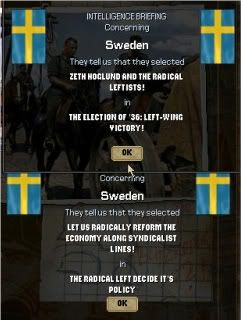
The Syndicalist Movement
Meanwhile, what many had expected to be a self indulgent series of negotiations in Paris rapidly changed tone as men like Marceau Pivert took the floor. The grand speeches given in Parisian halls rapidly turned from mere co-opperation to talk of global revolution and several nations, including the French Commune and Union of Britain pledged colossal sums of material and aid to revolutionary factions around the world.
German newspapers were quick to write off Pivert's grandiose call for the “obliteration of international Bourgeouise by and and all means at our disposal” as little more than empty bombast and sabre rattling.
It was a delusion the German people would continue to hold desperately to even as the United States and Spain were pulled into the fires of civil war.
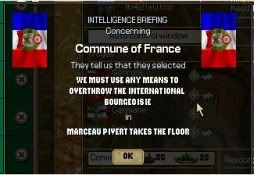
The Statments to emerge from the grand congress in Paris were unambiguous and absolute
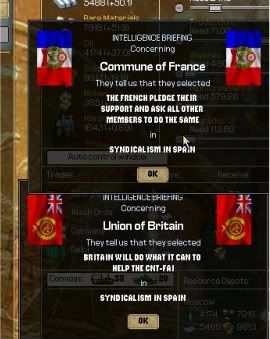
As was the response of the primary syndicalist powers..
Extract from the Letter of a Russian Staff officer to his wife following the anouncement of the President's military reform policy. said:My Dearest Maria
I pray this letter finds you well. I appologise for my lack of letters but the chaos beyond our borders has given the leadership, such as it is, reason to work us hard. I understand such news is slow to flow to the interior but you understand there are limits in what i can say in a personal comunication such as this one.
Suffice to say Spain seems to be teetering on the edge of civil war as its own anarchistic gangs clamour to take advantage of the economic crisis.
Even distant America is a land on the brink. I have contacted my cousin in New York and he reports that the decision to go ahead with general elections is an encouraging if dangerous move by the ruling party. I know America, once a beacon for immigration and prosperity has endured hard times, I only hope that she needn't suffer the years of war and suffering that afflicted Russia before finally returning to the light.
But it is here, in Europe and on our own frontiers that the most disturbing events are taking place.
--The red leadership are gathering in Paris, their plans for dominance soon to be laid out for all to see.
And of course there is Central Asia, where the forgotten provinces of the Empire continue to tear themselves apart under the leadership of ethnic cliques and Mad dictators. Turkestan, Mongolia, Georgia...they have become little more than pirate states and will demand our attention before long.
But as of now, we are far from ready.
If only you could see the bizarre dichotomy here. The streets are filled with people, trading living and loving as they did during the old days..before the troubles. The people are settled and increasingly content as priests tend to their sould and the Government guarantees them their daily bread. But behind closed doors there is chaos that must be resolved quickly if the miracle of this restoration is to last. Of this I can say no more, I ask only that you pray to the almighty that he may guide the all those here,especially those we once called our enemies .
There is hope for my homeland, of this I am certain, and she will soon rejoin the club of great states.
I fear however that her leadership may soon be desperately required by a world gone mad.
But you know i have made a career from paranoia, and so i beg you not to place too much stock in my ramblings. Please, tell me, has your Mother's health improved...
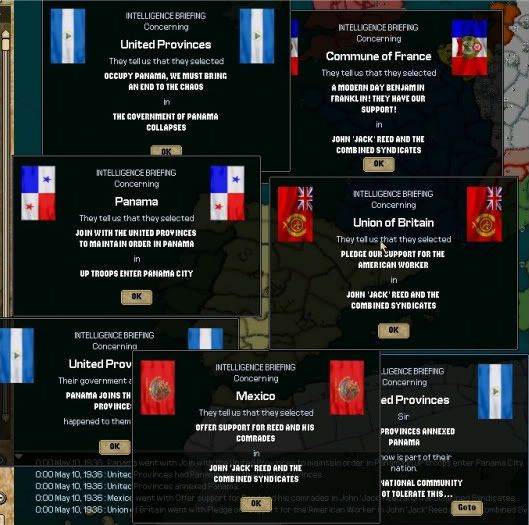
As Russia began to rebuild itself, the American continent buzzed with minor wars and foreign support for syndicalist groups
- Commune of France Intelligence Memorandum on Russia -1936 said:
On the issue of Russia
* The situation in Russia can be described as nothing other than the latest in a long string of failures by what remains of the Russian Bourgeoisie.
* We note that the unilateral appointment of an Aristocrat to the Presidency by the senate is likely to anger a populous that has already proved its hunger for the revolutionary cause.
* The appointment of a former Red officer to the General Staff is an unusual move, one that shows the new regime already feels the needs to pander to the remnants of the red army in order to avoid an imminent proletarian uprising.
* While German access to Russian raw materials of some concern, the farcical state of the Russian transportation and infrastructure net, combined with mutual suspicion is likely to stifle any meaningful exchanges.
Conclusion: Russia remains a low priority target, likely to lapse into civil war and Syndicalist take over within a year, three at the most. The priority for this office must continue to be the support of our Comrades in America, Spain and Sweden who's inclusion in the Syndicalist sphere would offer real, tangible benefits to the well-being of the national economy and the global movement.
Last edited:
- 2
Reader Comments:
@Kurt_Steiner: Thanks for the encouragement mate. While it's never too late to return, my real regret is that i ever left.
@Viden, yourworstknightm and Zzzzzz: thanks alot guys, having someone actually read these even before the firestorm of war strikes is a massive encouragement.
@Milites: Of course he's beloved by all, you just pointed out that he's assosciated with the image of sanctified russian tank divisions blasting away at the enemies of the motherland. That said, he's skill 5 and far from ideal, time will tell what becomes of Markov. Tukachevsky meanwhile may be a red but he knows which way the wind is blowing and faced with the choice between being a private in a WWI pattern infantry army and being the architecht of something very different i think the Grand Duke is willing to put serious money on him opting for the latter. Of course the Russian army is currently undertrained, underequiped, understrength and almost devoid of any mechanisation...not exactly the force Tukachevsky and Markov might envision...
A Final Question to Everyone and Anyone
Depending on what save i ultimately opt to load this may be a moot question but i'm interested. Where, were you the Grand Duke, which city would you nominate as Russia's capital. The recently renamed St.Petersburg or Moscow?
@Kurt_Steiner: Thanks for the encouragement mate. While it's never too late to return, my real regret is that i ever left.
@Viden, yourworstknightm and Zzzzzz: thanks alot guys, having someone actually read these even before the firestorm of war strikes is a massive encouragement.
@Milites: Of course he's beloved by all, you just pointed out that he's assosciated with the image of sanctified russian tank divisions blasting away at the enemies of the motherland. That said, he's skill 5 and far from ideal, time will tell what becomes of Markov. Tukachevsky meanwhile may be a red but he knows which way the wind is blowing and faced with the choice between being a private in a WWI pattern infantry army and being the architecht of something very different i think the Grand Duke is willing to put serious money on him opting for the latter. Of course the Russian army is currently undertrained, underequiped, understrength and almost devoid of any mechanisation...not exactly the force Tukachevsky and Markov might envision...
A Final Question to Everyone and Anyone
Depending on what save i ultimately opt to load this may be a moot question but i'm interested. Where, were you the Grand Duke, which city would you nominate as Russia's capital. The recently renamed St.Petersburg or Moscow?
Last edited:
Excellent AAR. Very glad its revival brought it to my attention.
If I were the Grand Duke I would move the capital to Moscow to emphasise my regime's links to ancient Russia, rather than the Western, Aristocratic connotations of St Petersburg. It is also a bit less vulnerable to gunboat diplomacy from Sydicalists or MittelEuropa.
If I were the Grand Duke I would move the capital to Moscow to emphasise my regime's links to ancient Russia, rather than the Western, Aristocratic connotations of St Petersburg. It is also a bit less vulnerable to gunboat diplomacy from Sydicalists or MittelEuropa.
Catched up with this one, I like this AAR! I hope you will be able to continue and finish it  , I like your writing style. I would suggest go for historical St. Petersburg...because you have focused on the czars and such and they would accept this going back to tradition. While it is harder to protect military, it would fit in your storyline
, I like your writing style. I would suggest go for historical St. Petersburg...because you have focused on the czars and such and they would accept this going back to tradition. While it is harder to protect military, it would fit in your storyline  .
.
Good luck with reclaiming the lost lands...
Tim
Good luck with reclaiming the lost lands...
Tim
Glad to find this, I'll be following. Regarding the capital question, I would say to go with St. Petersburg
St. Petersburg is the obvious choice.

I think the newest version of KR beefs Markov to skill 6 and adds another ability (combined arms?). Though he's still better than Soviet Russia's Tukaschevsky IIRC.

Of course he's beloved by all, you just pointed out that he's assosciated with the image of sanctified russian tank divisions blasting away at the enemies of the motherland. That said, he's skill 5 and far from ideal, time will tell what becomes of Markov. Tukachevsky meanwhile may be a red but he knows which way the wind is blowing and faced with the choice between being a private in a WWI pattern infantry army and being the architecht of something very different i think the Grand Duke is willing to put serious money on him opting for the latter. Of course the Russian army is currently undertrained, underequiped, understrength and almost devoid of any mechanisation...not exactly the force Tukachevsky and Markov might envision...
I think the newest version of KR beefs Markov to skill 6 and adds another ability (combined arms?). Though he's still better than Soviet Russia's Tukaschevsky IIRC.
- 1
It's best to keep the capital at St. Petersburg. Simply because it had been the capital for such a long time, it makes no sense to change it now.
How about a Guard 65th "Iron George" Armored division with the sigil of the St. George slaying mecha Godzilla 

